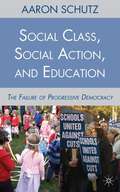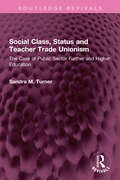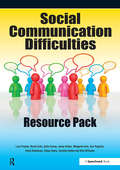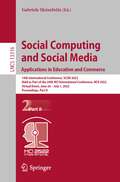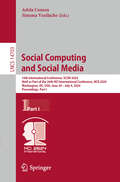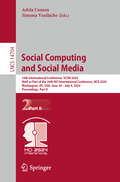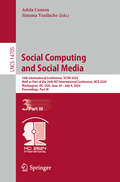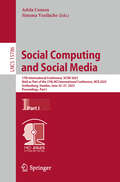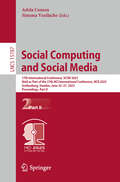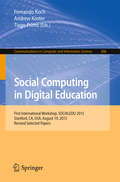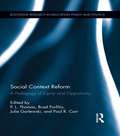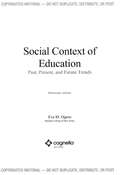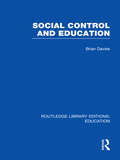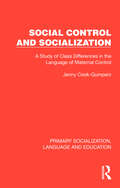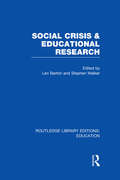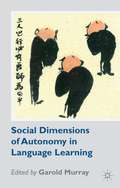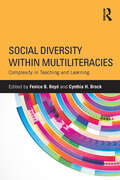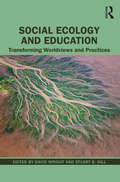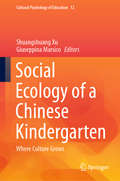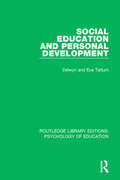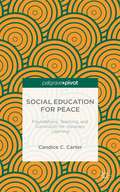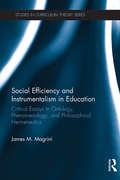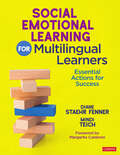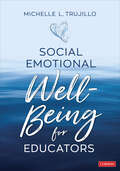- Table View
- List View
Social Class, Social Action, and Education
by Aaron SchutzSchutz demonstrates that progressive ideas of democracy emerged out of the practices of a new middle class, reacting, in part, against the more conflictive social struggles of the working-class. The volume traces two distinct branches of democratic progressivism: collaborative and personalist.
Social Class, Status and Teacher Trade Unionism: The Case of Public Sector Further and Higher Education (Routledge Revivals)
by Sandra M. TurnerFirst published in 1988, Social Class, Status and Teacher Trade Unionism examines some of the causes underlying the growing resentment of public sector professionals, focusing on the teachers in the polytechnics and colleges of further and higher education and on their union, once the Association of Teachers in Technical Institutions. It looks in depth at the relationship between professional commitment and trade union activism, and at the limits employee status, within a bureaucratic control structure, can impose on professional self-management and control. The book provides both an important social history of the teachers and teaching in this sector and an incisive analysis of the nature and development of ‘professional trade unions’. This book will be of interest to students of education, sociology and history.
Social Communication Difficulties Resource Pack
by Lucy ProsserDevised by members of the Speech and Language Therapy team in Portsmouth city teaching PCT, this advice pack breaks down social communication difficulties into four key areas: Language; Conversation skills; Social skills; and Selecting and organising information. The pack will facilitate identification and assessment of social communication difficulties and provide suggested intervention strategies related to specific areas of communication. A range of photocopiable handouts have been created which address each feature identified. The handouts provide a description of the SCD feature, examples of how this might present in children and then a list of practical suggestions for teaching specific skills. It is an excellent proactical resource.
Social Computing and Social Media: 14th International Conference, SCSM 2022, Held as Part of the 24th HCI International Conference, HCII 2022, Virtual Event, June 26 – July 1, 2022, Proceedings, Part II (Lecture Notes in Computer Science #13316)
by Gabriele MeiselwitzThis two-volume set LNCS 13315 and 13316 constitutes the refereed proceedings of the 14th International Conference on Social Computing and Social Media, SCSM 2022, held as part of the 24rd International Conference, HCI International 2022, which took place in June-July 2022. Due to COVID-19 pandemic the conference was held virtually.The total of 1276 papers and 275 posters included in the 40 HCII 2022 proceedings volumes was carefully reviewed and selected from 5583 submissions. The papers of SCSM 2022, Part II, are organized in topical sections named: social media in education; customer experience and consumer behavior.
Social Computing and Social Media: 16th International Conference, SCSM 2024, Held as Part of the 26th HCI International Conference, HCII 2024, Washington, DC, USA, June 29–July 4, 2024, Proceedings, Part I (Lecture Notes in Computer Science #14703)
by Adela Coman Simona VasilacheThis book constitutes the refereed proceedings of the 16th International Conference on Social Computing and Social Media, SCSM 2024, held as part of the 26th HCI International Conference, HCII 2024, which took place in Washington, DC, USA, during June 29–July 4, 2024. The total of 1271 papers and 309 posters included in the HCII 2024 proceedings was carefully reviewed and selected from 5108 submissions. The SCSM 2024 proceedings were organized in the following topical sections: Part I: Designing, developing and evaluating social media; user experience and user behavior in social media; AI and language models in social media; Part II: Social media in learning, education and culture; social media in business and ecommerce; Part III: Computer-mediated communication; social media for community, society and democracy.
Social Computing and Social Media: 16th International Conference, SCSM 2024, Held as Part of the 26th HCI International Conference, HCII 2024, Washington, DC, USA, June 29–July 4, 2024, Proceedings, Part II (Lecture Notes in Computer Science #14704)
by Adela Coman Simona VasilacheThis book constitutes the refereed proceedings of the 16th International Conference on Social Computing and Social Media, SCSM 2024, held as part of the 26th HCI International Conference, HCII 2024, which took place in Washington, DC, USA, during June 29–July 4, 2024. The total of 1271 papers and 309 posters included in the HCII 2024 proceedings was carefully reviewed and selected from 5108 submissions. The SCSM 2024 proceedings were organized in the following topical sections: Part I: Designing, developing and evaluating social media; user experience and user behavior in social media; AI and language models in social media; Part II: Social media in learning, education and culture; social media in business and ecommerce; Part III: Computer-mediated communication; social media for community, society and democracy.
Social Computing and Social Media: 16th International Conference, SCSM 2024, Held as Part of the 26th HCI International Conference, HCII 2024, Washington, DC, USA, June 29–July 4, 2024, Proceedings, Part III (Lecture Notes in Computer Science #14705)
by Adela Coman Simona VasilacheThis book constitutes the refereed proceedings of the 16th International Conference on Social Computing and Social Media, SCSM 2024, held as part of the 26th HCI International Conference, HCII 2024, which took place in Washington, DC, USA, during June 29–July 4, 2024. The total of 1271 papers and 309 posters included in the HCII 2024 proceedings was carefully reviewed and selected from 5108 submissions. The SCSM 2024 proceedings were organized in the following topical sections: Part I: Designing, developing and evaluating social media; user experience and user behavior in social media; AI and language models in social media; Part II: Social media in learning, education and culture; social media in business and ecommerce; Part III: Computer-mediated communication; social media for community, society and democracy.
Social Computing and Social Media: 17th International Conference, SCSM 2025, Held as Part of the 27th HCI International Conference, HCII 2025, Gothenburg, Sweden, June 22–27, 2025, Proceedings, Part I (Lecture Notes in Computer Science #15786)
by Adela Coman Simona VasilacheThis book constitutes the refereed proceedings of the 17th International Conference on Social Computing and Social Media, SCSM 2025, held as part of the 27th HCI International Conference, HCII 2025, which took place in Gothenburg, Sweden, during June 22–27, 2025. A total of 1430 papers and 355 posters included in the HCII 2025 proceedings was carefully reviewed and selected from 7972 submissions. The SCSM 2025 proceedings were organized in the following topical sections- Designing and Developing Social Interactions, Social Media in Learning and Education, Supporting Communication and Psychological Well-Being, User Behavior and Experience in Social Media, and, AI and Social Network Analysis.
Social Computing and Social Media: 17th International Conference, SCSM 2025, Held as Part of the 27th HCI International Conference, HCII 2025, Gothenburg, Sweden, June 22–27, 2025, Proceedings, Part II (Lecture Notes in Computer Science #15787)
by Adela Coman Simona VasilacheThis book constitutes the refereed proceedings of the 17th International Conference on Social Computing and Social Media, SCSM 2025, held as part of the 27th HCI International Conference, HCII 2025, which took place in Gothenburg, Sweden, during June 22–27, 2025. A total of 1430 papers and 355 posters included in the HCII 2025 proceedings was carefully reviewed and selected from 7972 submissions. The SCSM 2025 proceedings were organized in the following topical sections- Designing and Developing Social Interactions, Social Media in Learning and Education, Supporting Communication and Psychological Well-Being, User Behavior and Experience in Social Media, and, AI and Social Network Analysis.
Social Computing in Digital Education
by Fernando Koch Andrew Koster Tiago PrimoThis book constitutes the refereed proceedings of the First International Workshop, SOCIALEDU 2015, held in Stanford, CA, USA, in August 2015. The workshop aimed to discuss computational models of social computing applied to Digital Education. The 9 revised full papers presented were carefully reviewed and selected from 12 submissions. The papers address issues such as novel data mining and machine learning for social intelligence in digital education. - Social modelling and simulation to investigate social behaviours, emotional intelligence, influence processes and other social aspects that may influence learning performance in an educational environment. - Smart environments and interactive systems of social computing in digital education. - Analysis of social media and media intelligence in digital education. - Mobile social gaming in digital education. - The utilization of mobile and wearable technology in social systems in digital education, and others.
Social Context Reform: A Pedagogy of Equity and Opportunity (Routledge Research in Education Policy and Politics #5)
by Julie Gorlewski P. L. Thomas Brad Porfilio Paul R. CarrCurrently, both the status quo of public education and the "No Excuses" Reform policies are identical. The reform offers a popular and compelling narrative based on the meritocracy and rugged individualism myths that are supposed to define American idealism. This volume will refute this ideology by proposing Social Context Reform, a term coined by Paul Thomas which argues for educational change within a larger plan to reform social inequity—such as access to health care, food, higher employment, better wages and job security. Since the accountability era in the early 1980s, policy, public discourse, media coverage, and scholarly works have focused primarily on reforming schools themselves. Here, the evidence that school-only reform does not work is combined with a bold argument to expand the discourse and policy surrounding education reform to include how social, school, and classroom reform must work in unison to achieve goals of democracy, equity, and opportunity both in and through public education. This volume will include a wide variety of essays from leading critical scholars addressing the complex elements of social context reform, all of which address the need to re-conceptualize accountability and to seek equity and opportunity in social and education reform.
Social Control and Education: Class Inscription And Symbolic Control (Routledge Library Editions: Education)
by Brian DaviesSocial control is a central sociological concept which has generated many influential ‘models’ of man in society. This book examines these major models, and examines the rise of compulsory schooling in Britain and the USA and shows us which aspects of education and social control have been elaborated or neglected in the sociology of education down to the mid 1970s.
Social Control and Socialization: A Study of Class Differences in the Language of Maternal Control (Primary Socialization, Language and Education)
by Jenny Cook-GumperzBasil Bernstein’s theory of social control was the foundation for this pioneer study of the language mothers use to socialize their children, and how it affects their understanding of social values and social attitudes as they grow older.Originally published in 1973, Dr Cook-Gumperz’s research was particularly important in that it made use of analytical methods which could measure numerically the manifestations of the three kinds of control – imperative, positional, personal – that Bernstein distinguished. Using the coding grid developed by Professor Bernstein and herself, Jenny Cook-Gumperz demonstrates clearly the relations between maternal class, maternal approach to discipline and the child’s progress. By showing that the effects of early upbringing on the educational potential of children were measurable, this significant work in the comparatively new field of sociolinguistics would form a basis for the methodological approach to further practical investigations of a similar nature at the time. Today it can be read in its historical context.
Social Crisis and Educational Research (Routledge Library Editions: Education)
by Stephen Walker Len BartonOriginally written at a time of crisis in the education system of Britain – occasioned by cuts, contradictions and change - many of the issues discussed in this book are still relevant today. Debate in the book focuses upon an examination of the nature of the crisis, an exploration of the impact of the crisis upon school processes and upon the relationship between life in school and in the wider community, an investigation of the responses being made by pupils, teachers and educationalists to the day-to-day manifestations of the crisis and a consideration of how the current crisis is giving a particular poignancy to issues to do with the theories and methods employed in our study and interpretation of contemporary educational processes.
Social Dimensions of Autonomy in Language Learning
by Garold MurrayThis book examines how autonomy in language learning is fostered and constrained in social settings through interaction with others and various contextual features. With theoretical grounding, the authors discuss the implications for practice in classrooms, distance education, self-access centres, as well as virtual and social learning spaces.
Social Diversity within Multiliteracies: Complexity in Teaching and Learning
by Fenice B. Boyd and Cynthia H. BrockUsing a multiliteracies theoretical framework highlighting social diversity and multimodality as central in the process of meaning making, this book examines literacy teaching and learning as embedded in cultural, linguistic, racial, sexual, and gendered contexts and explores ways to foster learning and achievement for diverse students in various settings. Attending simultaneously to topics around two overarching and interrelated themes—languages and language variations, and cultures, ethnicities, and identities—the chapter authors examine the roles that multiliteracies play in students’ lives in and out of classrooms. In Part I, readers are asked to examine beliefs and dispositions as related to different languages, language varieties, cultures, ethnicities, and identities. Part II engages readers in examining classroom and community practices related to different languages and language varieties, cultures, ethnicities, and identities.
Social Ecology and Education: Transforming Worldviews and Practices
by David WrightSocial Ecology and Education addresses "ecological understanding" as a transformative educational issue: a learning response to emerging insights into social-ecological relationships and the future of life on our planet. In the face of the existential threats posed by climate change, loss of biodiversity, pandemids and the associated ecological and social challenges; there is a need to extend our responses beyond scientific inquiry and technological initiatives. This book seeks to move the dialogue towards a deeper and broader understanding of the complexities of the issues involved. To achieve this, the book discusses issues rarely addressed through programs in "Education for Sustainability" and "Environmental Education," such as student defined knowledge systems, deep engagement with the implications of indigenous understandings, climate change as symptomatic of broad epistemological problems, social disengagement and differentiated barriers to meaningful change. This work is enriched by its focus on the learning and the learning systems that have led to our current predicament. This book seeks to initiate considerations of this kind, to invigorate education for sustainable, equitable, healthy and meaningful futures. As such, this book will be of great interest to undergraduate and postgraduate students in a range of education and environmental courses.
Social Ecology of a Chinese Kindergarten: Where culture grows (Cultural Psychology of Education #12)
by Giuseppina Marsico Shuangshuang XuThis book is the outcome of a joint collaboration between East China Normal University and the University of Luxembourg, initiated by the Center of Ideas for the Basic Education of the Future (IBEF), and focuses on kindergartens in China from a cultural psychology perspective. By coupling young scholars from diverse cultural backgrounds as research tandems, this book uses an innovative methodological method to reveal a deeply immersing research perspective of the often complicated issues in the Chinese social reality, where long historical tradition and strong motivation for a “modernized” future are fused together and continuously evolve itself into a vibrant and intricate landscape. Meanings and values consciously or unconsciously promoted and conducted in the kindergarten are semiotic devices and they mediate children’s and educator’s daily behaviours and activities, which are constantly navigating among different social institutions and crossing the border of kindergarten. The book discusses the process of children’s socialization in the kindergarten from different angles such as cultural objects, moral education, conflict negotiation, children's drawing analysis and the role of Lego in numeracy development. It also provides an overview of basic educational needs in Chinese kindergartens as well as three commentaries to provide background information and to add a reflective angle for the readers. By reading the book, readers will hopefully go through a constantly transforming process between familiarizing and de-familiarizing along with the research tandem and develop their own understanding of the complex landscape of the Chinese kindergarten and its children as developing subjects constantly living and transcending the context.
Social Education and Personal Development (Routledge Library Editions: Psychology of Education)
by Delwyn Tattum Eva TattumThe National Curriculum had placed personal and social education on the agenda of every primary school. This book, originally published in 1992, examines the quality and nature of relationships which contribute to a child’s personal development and social awareness, and discusses how schools organise pupil experiences and the complex interactions in classrooms. At the formal level it looks at how PSE may be taught through cross-curricular, thematic approach to all age groups.
Social Education for Peace: Foundations, Teaching, and Curriculum for Visionary Learning
by Candice C. CarterCarter illuminates and validates the vital role of visioning in social education. The book features peace in social education with instructional recommendations, planning resources and descriptions of transdisciplinary learning. It elaborates mindful citizenship across social, environmental, ethical, geographic, economic and political realms.
Social Efficiency and Instrumentalism in Education: Critical Essays in Ontology, Phenomenology, and Philosophical Hermeneutics (Studies in Curriculum Theory Series)
by James M. MagriniDistinct among contemporary philosophical studies focused on education, this book engages the history of phenomenological thought as it moves from philosophy proper (the European phenomenological-hermeneutic tradition) through curriculum studies. It thus presents the "best of both worlds" for the reader; there is a "play" or movement from philosophy proper to educational philosophy and then back again in order to locate and explicate what is intimated, suggested, and in some cases, left "unsaid" by educational philosophers. This amounts to a work on education-philosophy that elucidates, through various permutations within the unique foci of each essay, the general phenomenological theme of the fundamental ontology of the human being as primordial learner. Reflecting his experience as scholar, teacher, and perennial learner, the author suggests how research in phenomenology might prove beneficial to the enhancement of both the theoretical and practical aspects of education; readers are invited to envision education as far more than merely a means by which to organize an effective learning experience in which knowledge is assimilated and skill sets are efficiently imparted, but rather as a holistic and integrated process in which knowing, acting, and valuing are original ways of Being-in-the-world.
Social Emotional Learning for Multilingual Learners: Essential Actions for Success
by Diane Staehr Fenner Mindi TeichFoster multilingual learners’ academic success, wellbeing, agency, and belonging Though multilingual learners (MLs) comprise nearly 25% of the school-age population, the most widely-used social emotional learning (SEL) frameworks and programs lack an intentional focus on these students’ unique strengths and challenges. To foster MLs’ academic success and wellbeing, educators must consider students’ cultures, languages, assets, expectations, norms, and life experiences when integrating SEL practices. In this groundbreaking book, Dr. Diane Staehr Fenner and Mindi Teich break down how each of the five competencies in the Collaborative for Academic, Social, and Emotional Learning (CASEL) SEL framework can be implemented with ML success in mind. Staehr Fenner and Teich’s practical and engaging guide provides SEL considerations that are unique to MLs, relevant research, easy-to-implement educator actions, and tools to seamlessly integrate SEL practices into content and language instruction. Additional features include: Tools and practical strategies educators can apply immediately Programmatic and systemic considerations that impact SEL for MLs Examples of successful SEL strategies for MLs currently being used in classrooms Ample opportunities for reflection and application in each chapter Templates to prioritize and integrate SEL for MLs into teaching practices MLs thrive when they are validated and supported to achieve their goals, empathize with others, build relationships, and make responsible decisions. The essential actions presented in this guide will enable you–regardless of your role or prior experience with SEL–to empower MLs to achieve academic and lifelong success.
Social Emotional Learning for Multilingual Learners: Essential Actions for Success
by Diane Staehr Fenner Mindi TeichFoster multilingual learners’ academic success, wellbeing, agency, and belonging Though multilingual learners (MLs) comprise nearly 25% of the school-age population, the most widely-used social emotional learning (SEL) frameworks and programs lack an intentional focus on these students’ unique strengths and challenges. To foster MLs’ academic success and wellbeing, educators must consider students’ cultures, languages, assets, expectations, norms, and life experiences when integrating SEL practices. In this groundbreaking book, Dr. Diane Staehr Fenner and Mindi Teich break down how each of the five competencies in the Collaborative for Academic, Social, and Emotional Learning (CASEL) SEL framework can be implemented with ML success in mind. Staehr Fenner and Teich’s practical and engaging guide provides SEL considerations that are unique to MLs, relevant research, easy-to-implement educator actions, and tools to seamlessly integrate SEL practices into content and language instruction. Additional features include: Tools and practical strategies educators can apply immediately Programmatic and systemic considerations that impact SEL for MLs Examples of successful SEL strategies for MLs currently being used in classrooms Ample opportunities for reflection and application in each chapter Templates to prioritize and integrate SEL for MLs into teaching practices MLs thrive when they are validated and supported to achieve their goals, empathize with others, build relationships, and make responsible decisions. The essential actions presented in this guide will enable you–regardless of your role or prior experience with SEL–to empower MLs to achieve academic and lifelong success.
Social Emotional Well-Being for Educators
by Michelle L. TrujilloLearn how to take self-care off your to-do list! It’s been a rough couple of years for teachers and school leaders. Your ability to be resilient and concentrate on social-emotional learning has been put to the test and now you deserve relief—without the pressure of having yet one more thing piled on your plate. This book’s unique and compelling framework empowers you to practice self-care through thoughts and actions that are within your control, enhancing your well-being without taking on extraneous responsibilities. Features include A checklist for determining your baseline of strengths and needs Self-reflection questions, journaling opportunities, and action-planning exemplars A process for tracking, celebrating, and revising your own tangible objectives Teaching guidance for distance or hybrid education Strategies to share with your students It’s right there in the word: well-being! It isn’t a thing to do, but a way to be. When you integrate the principles of SEL into your everyday life, you’ll be a person of joy, peace, and gratitude — and a more inspired and empowered educator.
